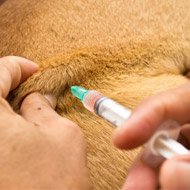
Rabies remains one of the most serious infectious diseases that can be transmitted from animals to people
To mark World Rabies Day (September 28), the Federation of Veterinarians of Europe (FVE) are urging veterinary surgeons and companion animal owners to remain vigilant of the disease.
Although it can be prevented by vaccination, rabies remains one of the most serious zoonotic diseases.
To be effective in humans, the vaccine must be given well before, or immediately after, rabies is contracted. If vaccination isn't carried out properly and disease symptoms start to occur, the disease is incurable and fatal.
It is estimated that 55,000 people across the globe die from rabies each year - most of which are young children who have become infected via a dog bite. Therefore vaccinating dogs against the disease is a key part of protecting people, particularly children.
The incidence of rabies has dropped hugely in the European Union, which is mainly due to the vaccination of dogs and wildlife, according to FVE. However, the disease is still present in certain countries. In others, the threat of rabies is re-emerging due to the growing reservoir of disease in wildlife. The FVE say that efforts to eradicate the disease need to be strengthened in areas where rabies is present.
In order to help companion animal owners and veterinary surgeons understand the new EU legislation regulating pet passports, due to come into force on December 29, the FVE and the European Commission have developed a question and answer session.
The FVE say that veterinary surgeons and animal owners must stay vigilant, especially with regard to dog imports into rabies free areas, from areas where the disease has not been eradicated.
FVE president Christophe Buhot says: “Enforcement of rules on companion animal movements remains a priority. Effective and reliable systems of identification and registration of dogs are crucial for successful animal health and welfare management. Dog identification and registration contributes to prevent and control diseases, it helps to prevent illegal puppy trading and to promote responsible dog ownership. It is also very helpful to reunite lost dogs with their owners.”
Together with the American and Canadian Veterinary Medical Associations, FVE has launched a "Joint position on the Global Control of Canine Rabies". The joint position outlines a successful rabies control plan, stressing the role played by the veterinary profession in fighting the disease.



 FIVP has shared a survey, inviting those working in independent practice to share their views on the CMA's proposed remedies.
FIVP has shared a survey, inviting those working in independent practice to share their views on the CMA's proposed remedies.